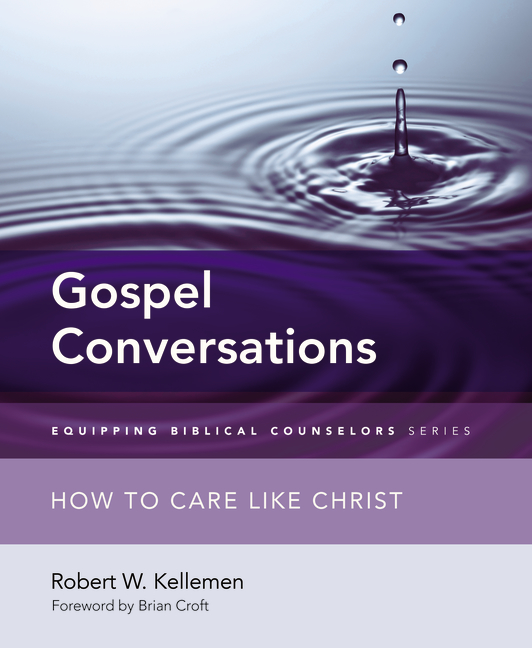by Lucy | Dec 6, 2016 | biblical counseling |

Is “biblical counseling” the same as “Christian counseling”?
Very often it’s not.
I’m going to share a short story of what I learned the hard way. I want to spare you unnecessary pain and confusion. Sound cool?
Before I made an appointment with a “Christian” counselor, I wish I had heard these words from Pastor John MacArthur: “Modern psychologies use hundreds of counseling models and techniques based aon a myriad of conflicting theories, so it is impossible to speak of psychotherapy as if it were a unified and consistent science.”
And this from Elyse Fitzpatrick:
Sadly, what Christian women need to know to live an abundant life is not found in many of today’s ‘Christian’ self-help books. Instead of guidance in knowing and pleasing God, which is the way to finding abundant life, we are given man-centered philosophies on how to love ourselves more, how to get more out of life, how to assert ourselves.
Our greatest need is being ignored.
Click & Tweet!
What we need most of all is to know God.
Click & Tweet!
I pray you’ll have more discernment than me when you decide to reach out for help. Would you like a great way to find profiles of excellent female biblical counselors who have been vetted? Check out my Heart2Heart Counselor Directory.
Finding a Counselor the Old Way
In my early 30s, I grabbed the phone book — Google had yet to come on the scene — and looked up “counseling,” searching for a Christian counselor. I figured he’d counsel by the Bible. Foolish me.
We prayed once in a while, but he also encouraged a crazy technique called transference. I became to depend on him for my happiness. I wanted his approval not God’s And every time I left the counseling office I felt worse, and my “counselor addiction” grew.
He said this transference meant I was healing. I was getting worse! He said to expect this as I got better emotionally. Are you shaking your head?
To make a long story short, for my emotional and spiritual health, I had to ditch this counselor.
Click & Tweet!
Quick. (It took my a year and I half to figure this out!)
God through the Word set me free. Good-bye, confusion. Years later I stumbled on true biblical counseling. What a difference!
Embracing the Best
Here’s the great definition of biblical counseling out there. It’s by Bob Kellermen.
If you ever need help, as I did, as we all do from time to time, contact me. Biblical e-counseling is effective and affordable. Most of my clients need eight visits or less (in person or by Skype).
Here is part of Bob’s definition. I made a few edits but kept the meaning fully intact.
Biblical counseling is not “beating people over the head with the Bible.”
Nor is it saying, “take two verses and call me in the morning.”
And it is not one-problem, one-verse, one-quick-solution.
Rather,
Biblical counseling depends upon the Holy Spirit
to relate God’s inspired truth
about people, problems, and solutions
to human suffering and sin
to empower people to exalt and enjoy God
and to love others
by cultivating conformity to Christ and communion with Christ
and the Body of Christ.
Question: Have you had a bad Christian counseling experience? Share in Comments, below.
Sharing Hope with Your Heart,


by Lucy | Nov 19, 2015 | biblical counseling, biblical counseling
 Friends, as you know, I counsel hope and happiness to the heart. Among my newest favorite books on counseling and the gospel is Gospel Conversations: How to Care Like Christ by Dr. Bob Kellemen.
Friends, as you know, I counsel hope and happiness to the heart. Among my newest favorite books on counseling and the gospel is Gospel Conversations: How to Care Like Christ by Dr. Bob Kellemen.
Bob asked me to share this book with you and I readily agreed. It is practical and honors Christ and is for any Christian who wants clear instruction on how to encourage, counsel, and comfort a hurting friend.
Praise be to the God and Father of our Lord Jesus Christ, the Father of compassion and the God of all comfort, who comforts us in all our troubles, so that we can comfort those in any trouble with the comfort we ourselves receive from God. 2 Corinthians 1:3-4
Why Gospel Conversations?
LAM: Bob, with all the books available on biblical counseling, what prompted you to write Gospel Conversations: How to Care Like Christ? What is unique about this book?
BK: You’re correct that we live in a wonderful time where many fine books are being published on gospel-centered living and on biblical counseling. However, there are very few books designed as a training manual for becoming more like Christ in how we help hurting people.
Gospel Conversations walks readers through a biblical process for learning 21 biblical counseling relational skills, and it does it with one overarching strategy in mind:
We learn to become effective biblical counselors by giving and receiving biblical counseling in the context of real and raw Christian community.
LAM: Tell my readers more about this strategy of “learning by doing” that you emphasize in Gospel Conversations.”
BK: Here’s part of the problem, as I see it, in our equipping of biblical counselors and one-another ministers: most of our equipping is done by lecturing. As a result, many of our trainees end up thinking that counseling equals lecturing. Counseling training becomes a “brain dump” of content, rather than the personal application of God’s truth to our lives.
Instead, Gospel Conversations teaches that biblical ministry is always a combination of Scripture and soul, of truth and love. That’s why I designed Gospel Conversations with literally hundreds of built-in interaction guides where users of the book can give and receive counseling in their own lives.
Gospel Conversations is a relational training manual. In Gospel Conversations, we not only gain counseling competency to care like Christ, we also grow in Christlike maturity as we become more like Christ. There are hundreds of built-in prompts for “self counsel” so that readers are learning to apply truth to their lives as a foundation for learning to apply truth to other’s lives.
What Is a Gospel Conversation?
LAM: Clearly, Gospel Conversations is not your father’s textbook in biblical counseling equipping! So, what is a gospel conversation?
BK: In the book, I describe “gospel conversations” in several overlapping ways:
- In gospel conversations, together with our counselees we derive our understanding of earthly life from heaven’s viewpoint—we see life with Cross-eyes.
- In gospel-centered counseling and gospel conversations, the whole Bible story impacts the whole person’s whole story.
- Gospel-centered conversations promote personal change centered on the Person of Christ through the personal ministry of the Word.
- In gospel conversations, we first understand the gospel story, then we seek to understand our friends’ stories, then we journey together to intersect God’s eternal story and their temporal story.
Let’s ponder that last description. Picture yourself with a hurting and struggling friend. You’ve embedded gospel truth in your soul, but you don’t just shout, “Gospel!” the second they ask to talk. No. You listen well and wisely, compassionately and comprehensively, to their journey. Then, rather than just quoting a verse, perhaps out of context, together you explore the narrative of God’s Word as it specifically relates to their life—the whole Bible story impacting the person’s whole story.”
Two Guideposts of Biblical Counseling
LAM: You outline gospel conversations with the picture of two guideposts of biblical counseling. Help my readers to understand these guideposts.
BK: Again, let’s place ourselves sitting across from a troubled, hurting, and confused friend. They’ve just “spilled their guts.” Our minds are racing. Where do we start? Where do we go?
We need a GPS—Gospel Positioning Script. We need some basic biblical handles to provide some wisdom structure to our counsel. Here’s a phrase I use to help us to ponder those handles:
We are saints who face suffering and fight against sin on our sanctification journey.
I’ve found that some counseling seems only to focus on suffering. Other counseling seems only or primarily to focus on sin. Instead:
Biblical counseling must deal thoroughly both with the evils we have suffered and with the sins we have committed.
It’s Normal to Hurt
and Possible to Hope
LAM: You then build upon these two guideposts by talking about 4 biblical compass points for biblical counseling. What are these compass points?
BK: Real life is messy, right? As is real and raw counseling. And most counseling situations will always deal with suffering (parakaletic care) and sin (nouthetic care). But the question is, ‘How do we care like Christ in suffering and sin?’
Based upon my examination of Scripture and of church history, in Gospel Conversations, I outline four compass points to give us some wisdom-based direction. The first two relate to suffering/sanctification and parakaletic care.
As you engage with a suffering friend, picture yourself pivoting between two worlds: the earthly world of their suffering where life is bad, and the eternal world of their hope in Christ that reminds us that God is good. We always listen with both ears—to our friend’s story and to God’s story. In sustaining, we offer comfort by empathizing with our friend and communicating that ‘it’s normal to hurt.’ In healing, we offer encouragement by enlightening our friend to the gospel truth that in Christ ‘it’s possible to hope.’
It’s Horrible to Sin,
Wonderful to Be Forgiven, Supernatural to Mature
The second two compass points relate to sin/sanctification and nouthetic care:
- It’s Horrible to Sin, But Wonderful to Be Forgiven
- It’s Supernatural to Mature
Here we are once again pivoting—this time between sin and grace. And we always do so with a Romans 5:20 mindset that where sin abounds grace super abounds. Further, we maintain the mindset that grace is not only salvation grace but also sanctification grace—so we help people to grasp the depth of their sin (‘it’s horrible to sin’), the infinite depth of Christ’s grace, (‘it’s wonderful to be forgiven’), and the power of grace to make us more like Christ (‘it’s supernatural to mature”).
Gospel Conversations journeys with readers through 21 biblical counseling skills of sustaining, healing, reconciling, and guiding. Through counseling illustrations, you learn the art of biblical parakaletic and nouthetic counseling.
LAM: I know that there is a companion book to Gospel Conversations called Gospel-Centered Counseling: How Christ Changes Lives. How do these two books relate to each other?
BK: Both books are part of a two-book series I’ve published with Zondervan called the Equipping Biblical Counselors Series. As we’ve seen, Gospel Conversations is a training manual in biblical counseling methodology—relational competencies to care like Christ. Gospel-Centered Counseling is a training manual in biblical counseling theology—showing how Christ changes lives. In Gospel-Centered Counseling, we learn together how the gospel victory narrative relates to our counseling ministry. We learn how theology relates to counseling and to daily life.
LAM: Bob, how can people learn more about Gospel Conversations?
BK: Thanks for asking. At my RPM Ministries site, visitors can view blog posts about Gospel Conversations, they can read endorsements, they can read the Foreword by Pastor Brian Croft, and they can purchase Gospel Conversations for 40 percent off at the Gospel Conversations portion of my site.
Counseling Hope and Happiness,

by Lucy | Jun 18, 2013 | biblical counseling |

Is Freud Dead? These three words on a Time cover raised eyebrows twenty years.
Yet many in the Church — Christians in the pews and their pastors — flock to the offices of state-licensed professional counselors today; even though Sigmund Freud, the father of modern psychology called religion a “universal, obsessional neurosis.” (Cited in Frank B. Minirth, Christian Psychiatry, Revell, 1977.) Freud and his students clung to blatantly anti-Christian ideas and practices.
And off to psychologists, Christians marched.
Why Do Christians See Psychotherapists?
Do Christians turn to psychotherapists because the psychotherapy industry grew in power and acceptance in a secular America? Yes. It’s a billion-dollar business.
Do Christians turn to psychotherapists because too many pastors capitulated to the thinking that psychotherapists had better knowledge and more effective therapies than God’s Words? Sadly, yes.
Do Christians turn to psychotherapists because the Bible and its truth (and the Truth–Jesus Christ) is lacking? No. Here’s one of many power Scriptures on counseling.
All Scripture is God-breathed and is useful for teaching, rebuking, correcting and training in righteousness, so that the servant of God may be thoroughly equipped for every good work. 2 Timothy 3:16-17
Some Christians who care about people become psychotherapists and say they integrate biblical belief with psychological philosophy and techniques, claiming that through integration they have more tools in their tool box. More tools in their tool box? “‘Christian psychology’ as the term is used today is an oxymoron‘,” say John MacArthur and Wayne Mack in Introduction to Biblical Counseling (Word Publishing, 1994, 10).
A Shift
The tables are turning. Biblical counselors such as Bob Kellemen, Executive Director of the Biblical Counseling Coalition, and others are binding together to bring counseling of the Word (or, biblical counseling) back to the Church. In a recent blog post, Dr. Bob pokes this thorny issue.
The bottom-line question: Shouldn’t counseling of the Word be in the Church?
Please discuss in Comments at the very bottom of this post. Here’s Dr. Bob:
Grab Your Smartphone?
“Real life issues motivated the Apostle Paul to write to the Colossians from his prison cell. The Christians in Colosse were facing suffering—condemnation from Satan (Col. 1:22), judgment by others (Col. 2:16), interpersonal grievances and struggles (Col. 3:13, 15), and family discord (Col. 3:19-21). They were also battling sinful temptations—sexual immorality, impurity, lust, evil desires, greed, anger, rage, malice, slander, and lying (Col. 3:5-9).
In today’s world, these are the type of life issues that cause us to grab our smartphone and schedule a counseling appointment. . . Read the rest of Bob’s amazing article here.
photo credit: h.koppdelaney via photopin cc






